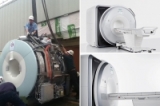Piece of Mind: Upgrade of MNC MRI to Enhance Brain Imaging

Together with major contributions from the BBI and BSOS, a new Research Instrumentation Fund award will improve the temporal and spatial resolution of MR imaging at UMD and enhance campus neuroscience research.
The University of Maryland’s magnetic resonance imaging (MRI) scanner is about to receive an update that will enhance the quality of brain images and offer the newest methods for noninvasive imaging of the structure and function of the human brain. Supported by a University of Maryland Research Instrumentation Fund award, the upgrade to campus’s MRI will transform the scanner into a state-of-the-art system with improved spatial and temporal resolution as well as new imaging modalities previously unavailable at UMD.
The endeavor to upgrade the facility was spearheaded by the Brain and Behavior Institute (BBI), with support from the College of Behavioral and Social Sciences (BSOS), the College of Education (EDUC) and the School of Public Health (SPHL). “We are grateful to Interim Senior Vice President and Provost Ann Wylie, Vice President for Research Laurie Locascio and President Darryll Pines for their continued investment in campus neuroscience,” said Elizabeth (Betsy) Quinlan, Professor in the Department of Biology, Clark Leadership Chair in Neuroscience and Director of the BBI. “The MRI upgrade will elevate the quality of brain image capacity and impact numerous faculty within the BBI. It will also boost UMD’s competitiveness for external funding and place the university on par with other leading national and international institutions in human neuroimaging work.”
The upgrade to the Siemens 3 Tesla PRISMA system replaces the former Siemens 3 Tesla TRIO scanner—a significant enhancement in the highly dynamic field of neuroimaging, where techniques rapidly evolve. The new PRISMA MRI will significantly improve the signal-to-noise ratio of acquired images by doubling the number of imaging elements found in its predecessor, upping this figure from 32 to 64. In addition, the increased spatial and temporal resolution possible with the PRISMA system will allow campus neuroscience researchers to explore the finer details of brain function with the highest quality data from experimental subjects. The upgraded MRI will be located in the Maryland Neuroimaging Center (MNC), which is administratively housed in BSOS.
“The MNC has emerged as a critical scientific resource that is essential for our research efforts in cognitive neuroscience and a wide range of related fields including education and public health,” said Gregory Ball, Professor in the Department of Psychology and Dean of BSOS. “This upgrade will ensure that impactful research related to the functioning of the human brain will continue to occur at the University of Maryland, College Park.”
The upgrade will also benefit collaborations with the University of Maryland, Baltimore (UMB) that use MRI as a primary assessment mechanism. For example, bi-campus collaborations that depend on MRI imaging of high-risk subjects can be recruited from Prince George’s County, which greatly expands subject pools.
"The MNC is delighted to have received support from the UMD Research Instrumentation Fund,” said Luiz Pessoa, Professor in the Department of Psychology and Director of the MNC. “Being able to upgrade our MRI scanner means that Maryland researchers will be able to continue investigating the human brain, but now with enhanced resolution in both space and time, which helps enormously in both asking and answering important questions about how the human brain functions in typical and atypical behaviors. The financial support from the BBI was critical and, together with important financial support from BSOS, EDUC and SPHL, will allow us to completely upgrade our MRI scanner."
The PRISMA upgrade will sustain a number of significant longitudinal studies, particularly in the fields of aging and early development. One such study examines whether physical activity may offer protection from neurodegeneration and cognitive decline related to Alzheimer’s disease (AD). Led by J. Carson Smith, Professor in the Department of Kinesiology, the project aims to test exercise training as a low-cost, high-impact approach for AD prevention in order to enrich the quality of life for older adults.
“The PRISMA upgrade will give us greater sensitivity to the manner in which exercise may improve the integrity of neural networks in older adults who are at increased genetic risk for AD,” explained Smith.
The MRI upgrade also enables UMD to partner with sites that are part of the Baby Connectome Projectand to participate in the National Institutes of Health’s HEAL (Helping to End Addiction Long-term) Initiative. The latter is a 10-year study on the enduring effects of maternal substance abuse on infant and childhood brain and behavioral development. The HEAL Initiative application is led by Nathan Fox, Distinguished University Professor in the Department of Human Development and Quantitative Methodology, Tracy Riggins, Associate Professor in the Department of Psychology, and BrendaJones Harden at UMB.
“With the HEAL Initiative, MRI imaging will for the first time be able to provide a comprehensive look at how environmental factors impact brain development, and the PRISMA scanner is a crucial element in the competitiveness of UMD’s application to be one of 25 consortium sites nationwide selected to participate in this exciting study,” said Fox. “I want to thank Greg Ball and Betsy Quinlan for taking up this cause, orchestrating the application and advocating for the vital need of the upgrade.”
Participation in such national collaborations represents a significant benefit to all neuroscience research at UMD. “Longitudinal studies into changes in the brain in aging and early development exemplify the breadth and impact of the studies performed at the MNC by BBI researchers,” noted Quinlan. “Most broadly, the Research Instrumentation Fund award helps sustain BBI’s commitment to enhancing UMD’s imaging capacity at multiple scales."
